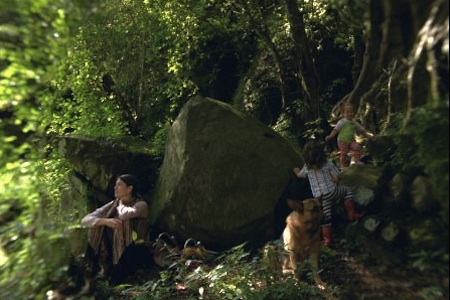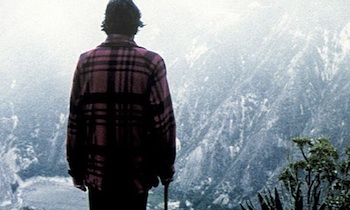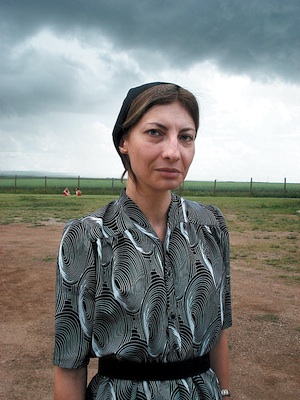It’s been a long, strange trip for Carlos Reygadas, who won Best Director at 2012 Festival de Cannes. Who would have thought this individual trained in law (specializing in armed conflict) and once employed by the United Nations would realize that what he wanted to make films—and then become one of the most celebrated filmmakers of his generation? Reygadas, ever enigmatic himself, specializes in the mysteries of transgression. He crossed socio-political and sexual boundaries while merging reality and fantasy in Japón (2002), Battle in Heaven (2005), and Silent Light (2007). His 2012 Cannes competition film, Post tenebras lux, immediately divided audiences, who greeted it with cheers and boos; schizophrenic reviews from the international critics followed. For this writer, it’s clear that Post… was the bravest, most innovative and visionary film in competition. In our conversation, Reygadas opens up about his working method, talks about how fear fuels human existence, and reveals how absurd he finds the imprinted human need for literal definition.
Keyframe: There is an urban legend saying that your crew consists of 11 people only.
Carlos Reygadas: Actually it’s even less. I can easily manage working this way; if my crew was larger, it would be terrible. I have one director of photography, his assistant, another guy doing the rest, sound-guy, Fernanda – my assistant director, a producer… Nine people altogether, not more. We do everything, all of us. Making films is not so difficult: Just take a camera, put it here, wait for good light, and little by little it will all come together. We do not think about what we do as ‘Ladies and gentlemen, this is Cinema.’ You could say my cinema is hand-made. We don’t use any artificial lights, so we’ve mastered the art of waiting. The budget of the film was about 500.000 Euro. I shot for about three months. Parts of Post tenebras lux were shot in the mountains, so we’d ride horseback, with all our equipment, to the location and shoot there. No one is allowed to talk loudly while we’re shooting. There’s no screaming announcing subsequent takes and slamming the clapperboard. It distracts people, us, me. We always do tap de fin, only a delicate clap at the end, when the take is done. If you start screaming before the take I have no idea how people are supposed to be able to concentrate!
Keyframe: How much does the fact that ‘you all do everything’ make your films a collective work?
Reygadas: Zero. If the film is supposed to be artistic in the sense that it shares someone’s feelings and his perception of life, it has to be done by himself. Even though I work with these people that I love and that help me so much, I’m the only one responsible for the film. Everything good in it is my accomplishment, everything bad, my fault.
Keyframe: Some of the press materials name Post tenebras lux autobiographical. Is it true?
Reygadas: It’s not. I just said that in the beginning to get some funding. [Laughs]. These are my real children in the film, our children. [He nods at his wife Natalia, who’s sitting right next to him and after whom the main female protagonist was named.] Those are our dogs… my dogs, actually. Those are not ours for a change. [Laughs]. We live in that land, so everything that happens in the film is very close to me. I’ve heard many of those conversations. I know these people very well. It’s all nearby. But the values of my characters and they way they look at the world are not at all autobiographical.
Keyframe: Your films are very often perceived as confusing or unclear, so much so that critics usually try to compare them to something first, to be able to start off the review. I’ve read that Japón was supposedly a variation on Tarkovsky, Silent Light was ‘clearly’ inspired by Dreyer, and in Post tenebras… Apichatpong Weerasethakul meets Aleksandr Sokurov… What is your response to that?
Reygadas: Well, on one hand I am flattered. Most of the films I like get bad reviews. Positive opinions are reserved for films that I do not enjoy. If many journalists hate it, to me it only means that there is a chance for such film to become something valuable one day. On the other hand I feel very sad, because I see how stupid the human kind can be.
Most of the films I like get bad reviews. Positive opinions are reserved for films that I do not enjoy. If many journalists hate it, to me it only means that there is a chance for such film to become something valuable one day.
Keyframe: I remember finding myself in the press room after the Post tenebras… screening among discontented journalists, scolding: ‘What is it about?’ ‘I don’t get it!’ Do we actually need to ‘get it’ at all?
Reygadas: Poor guys. ‘I understand the sea.’ [He points at the nearby shoreline.] ‘I don’t understand the sea, can you explain it to me?’ Or: ‘Look at the beautiful sunset!’ ‘I don’t understand it, let’s change the subject.’ Really, sometimes I am surprised, because I assume most of the journalists went to primary school, at least, and have read some books. I imagine that some maybe even went to university! I’m really astounded by the questions I hear from them. If you read Faulkner, James Joyce, you know that there are many things not designed to be understood on that level. When James Joyce wrote his books, especially Ulyssess, he was trashed by the journalists of that time. So, that’s why sometimes I find criticism flattering. Even in things that are supposedly meant to be understood, like literature, there are exceptions. Take Kafka’s The Castle, or better, The Metamorphosis: Who knows what really happens there? Does he really turn into a monstrous insect-like creature, or is it just the projection of his mind? ‘Oh, it’s just his mind. I really like the book;’ ‘Oh, it’s just his mind. I really hate it!’ It’s so stupid… why do I hear so many questions like that? Haven’t they ever read about history of art? How hostile the reaction of the environment was when abstraction or impressionist paintings started to emerge? How they’d preach those innovative artists, that things should be painted they way they appear, flesh should have a certain color, shapes should reflect real-life shapes… and these crazy people dared to paint skies green! And look at how they are perceived now. These ‘What is it?’ type question really surprise me.
Keyframe: So how do you construct your stories? Usually your plots are fragmentary, achronological, emotion-driven…
Reygadas: It is very subconscious. It’s like with a football player. Try asking him: ‘How do you do it?’ He won’t be able to name every stage of his decisive process, it’s very instinctive. It just comes to him, like it does to me. Think: Zinedine Zidane, great player. Do you think that before every attempt to shoot he processes the whole procedure in his head, like: ‘This kick is going to be a little bit of Pelé -style with a tiny touch of Maradona?’ No. He just does it thanks to his natural talent and the support of his experience, trained body, bone structure, muscle memory, the way he looks at life… I make films very instinctively, having in mind things I want to share. Post tenebras lux took me two days to write, however thinking about it lasted over two years… maybe not thinking, as this is a conscious process. I’d rather say it built up inside, without me even being fully aware of it. Then it just came out and flew. I trust that if I like something and feel it, some other people might feel the same way.
I felt an urge to share the love and fear we all feel for life. Fear is the main engine of the world we live in, especially in the western world. Some people have friends because they are pure and sociable, but most of us have friends because we are afraid of loneliness and lack of acceptance. A lot of people have a job because they need money, but many do it because they’re simply scared of being unemployed and being labeled outcasts. Most people spend holidays with their families not necessarily because of how much they love them—they are just afraid of being alone on Christmas Eve.
Keyframe: What was the emotional seed from which this project grew?
Reygadas: I felt an urge to share the love and fear we all feel for life. Fear is the main engine of the world we live in, especially in the western world. Some people have friends because they are pure and sociable, but most of us have friends because we are afraid of loneliness and lack of acceptance. A lot of people have a job because they need money, but many do it because they’re simply scared of being unemployed and being labeled outcasts. Most people spend holidays with their families not necessarily because of how much they love them—they are just afraid of being alone on Christmas Eve.
Keyframe: What you’re saying is in a way explanatory of people’s disappointment in your film. They might feel let down, because they need conclusions, assurance, they want to know in advance where is this journey going to end. Otherwise they don’t feel safe. But isn’t it about the journey itself? Because, once we die, everything is over—this is the conclusion, the journey’s over…
Reygadas: Exactly, that is one thing. And then, on another level, there are so many conclusions in this film. It’s a story about love, frustration, a family that carries on no matter what, about children who are pure and adults that cannot be pure or fully happy anymore, but nevertheless love each other very much and support each other till the end… It’s about the situation in my country, where people are being killed in the drug-related crimes, heads are being cut off, the land is bleeding… It’s about games we all play, since we are present in this world. It’s about a need to rebirth, about sex, about living close to animals that have been by our side since the very beginning and now we’ve drifted away from them. It’s about dreams and how we connect with our memories or [an] imagined future in our minds.
Keyframe: Future and past are displaced in your films. Instead of being grounded in certain moments, they freely float in the time and space.
Reygadas: Connecting with past or future is a very direct process that doesn’t use any codes. We can be here and start thinking about being in a swimming pool somewhere else. And such fantasies constitute a part of life, real life. Even though these things we portray in our thoughts might never happen. In the film we have this imagined future, where there is a Christmas party, and the protagonist dies in the end. The scene happens afterward in the film, but chronologically it’s earlier. People immediately get confused and wonder, how come he dies, if we’ve already seen him in his future, alive and kicking. But who says that the future has to happen? We think about it every day but it doesn’t mean it will come. You might have imagined yourself with children, I’m sure you have, most people do. Maybe you’ve been picturing yourself as an old person… what if you die tomorrow? Let’s hope not, but there is such possibility. That doesn’t mean these thoughts had not happened; they didn’t physically, but they are part of the reality, because they have already been conceived in your mind. The film is really coherent and objective on this level, not postmodernist or so in any way. On the other level, I fully agree with what you said. Things are not there to be understood. Most of the journalists are paid to judge. We are so proud of ourselves and we demand an explanation for every case, so we could understand and then judge. Whereas the truth is they should be kneeling down, feeling, receiving. I’m not saying the film is superior to them; but to be able to receive, one has to get down on his knees and accept. If you do that, you can get up afterward and say whatever you want. But if you don’t accept, you can’t judge. And these people very often don’t even try to accept. One journalist told me that she was a guest on the radio program, trying to pitch—the very word makes me angry—my film and she couldn’t. ‘So, what is it about?’ she asks me. ‘Thank you, that is the best compliment I could ever received’ was my answer. You can’t describe what my film is about? That’s excellent.
It’s a story about love, frustration, a family that carries on no matter what, about children who are pure and adults that cannot be pure or fully happy anymore, but nevertheless love each other very much and support each other till the end… It’s about the situation in my country, where people are being killed in the drug-related crimes, heads are being cut off, the land is bleeding… It’s about games we all play, since we are present in this world. It’s about a need to rebirth, about sex, about living close to animals that have been by our side since the very beginning and now we’ve drifted away from them. It’s about dreams and how we connect with our memories or [an] imagined future in our minds.
Keyframe: This need to describe and understand is sometimes a part of the critic’s job. Yet trying to pitch Post tenebras lux is pointless. If I had to describe it, I’d say that watching it I felt as if there were invisible hands reaching out from the screen, touching me gently on the face only to try to strangle me later…
Reygadas: Thank you. That is definitely a better compliment. [Laughs]. But you’re right. It’s definitely a matter of emotional characteristics of each viewer, and the ability to feel the film. You did, and some other people did as well. It’s not about watching the film either with your brain or your heart—they are both in consonance, that’s the truth. Claiming they’re not would be a pure relativism. Your brain is always there, rational and coherent, but always open. Reception of a film is more a matter of your own morals rather than brain or soul.
Keyframe: There are some very powerful, abstract images in your film—like the animated, fluorescent-red devilish faun figure that appears in the second sequence of it. Were you prepared for the whole spectrum of reactions they’ve caused?
Reygadas: This is very difficult to understand, but please try to, because if you do, you’ll get how people who make things for others work. I’m not a master of the ceremony, or an entertainer trying to lead people here or there, like I do with my children. I’d tell them stories and at certain point say, ‘and then the wolf came!!’—and in that moment they feel afraid. But I’m not doing that when making a film. I’m just giving you my thoughts directly, as if I opened an invisible window in my mind and you’d be looking inside. You look the way you want to and see what you are prepared to, or want to see, freely, in my head. I will not be your guide, showing you consequent rooms, explaining what the trip is about. I’m never thinking about how the audience will react once they see my film. I do it because I feel it. In the scene when one of the characters rips his head off, I felt the inspiration of the character. I knew there are heads rolling in my country so it seemed like a coherent image to me, that’s all. I’ve heard people laugh, and that was something I did not expect, to be honest. But it happened, and it’s OK with me. Later I understood where it was coming from. I’m not directing people like I was making a new BMW, or constructing a camera. Everybody reacts in their own way. I always respect the viewer.






